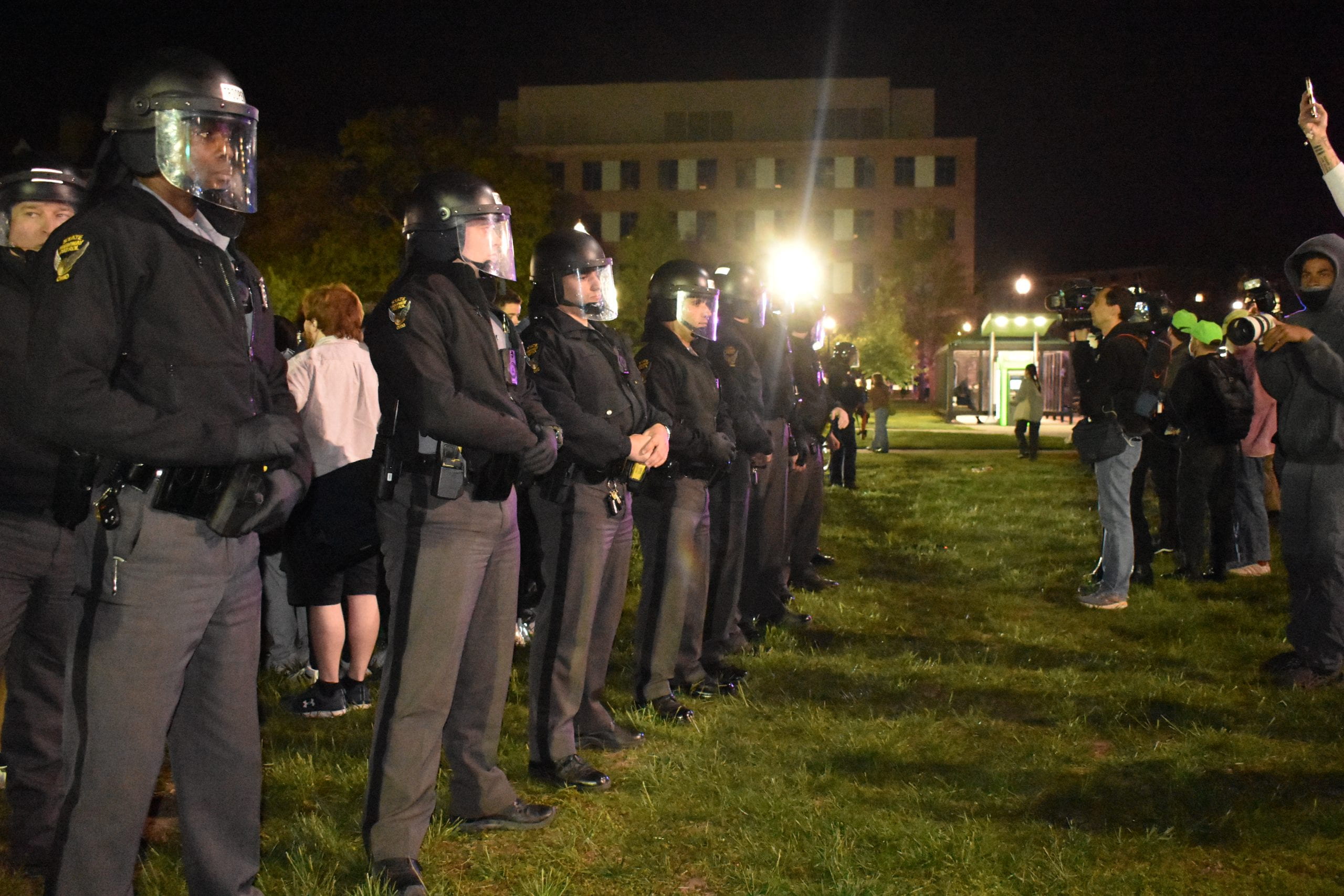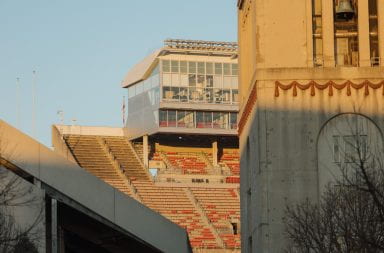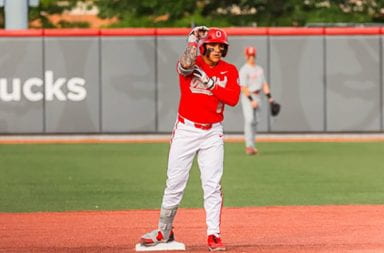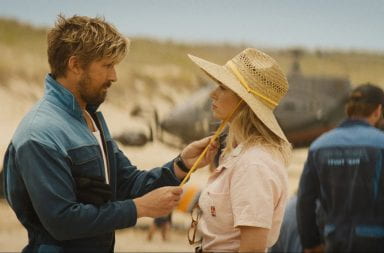
On Thursday, April 25, OSUPD officers arrested 16 students in the South Oval after a protest calling for full financial disclosure and for the university to divest in Israel assets. Credit: Arianna Smith | Editor-in-Chief
Ohio State’s Undergraduate Student Government released a statement on Instagram Sunday condemning the university’s response to Thursday’s protest, during which demonstrators called for full financial disclosure and for the university to divest in Israel assets, all while standing in solidarity with protesters fighting for the same cause at other universities. The protest resulted in 36 arrests, 16 of which were students.
Signed by Bobby McAlpine and Justin Robinson — the president and vice president of USG, respectively — the statement calls for Ohio State to alter its protocols to “ensure the safety of the student body,” extending to the treatment of students while in jail custody.
“The conditions described by many arrested students are unacceptable,” the statement said. “The Ohio State Police Department, Ohio State Highway Patrol, and the Franklin County Sheriff’s Office must find and implement better ways to deal with high-tension situations to ensure the safety of all students on our campus.”
McAlpine said he’s received feedback that once demonstrators were processed at the Franklin County Jail, they were stripped of their hijabs, which they are required to wear as part of their religious practices.
“That’s not acceptable to me,” McAlpine said. “That is the reason why we included the Franklin County Sheriff’s Department in the statement, because light needs to be brought onto that.”
After receiving news of the events that occurred at Thursday’s protest, McAlpine said USG called a meeting with university officials to inquire about the photos and videos circulating social media and address some concerns they had as an organization.
“After doing that, we met with our senior staff and we decided that we wanted to do a statement just to let the student body know we see exactly what happened and how ugly it was, and how it should not happen again, period,” McAlpine said.
McAlpine said USG’s main priority is ensuring students are safe and not subject to arrest for “exercising their First Amendment rights.”
“Of course, we’re not law enforcement experts, so we can’t tell people how to do their job, but what we are experts in is students, because we are students,” McAlpine said. “And we want to make sure that no matter when a student is protesting, whatever a student is doing, they feel safe, and quite frankly, many students — and I would go as far as saying students of color — do not feel safe on this campus. And that needs to be changed.”
Jineen Musa, a second-year and outreach director of Students for Justice in Palestine, said for someone on the outside looking in, USG’s statement would seem sufficiently critical of the university’s actions.
However, for someone who has been involved with SJP and experienced Thursday’s events firsthand, Musa said the statement fell short and the condemnation of the university was “not strong enough.”
“The brutalization itself is against students and it’s coming directly from the university. The snipers that were stationed on top of the student building, that was allowed by the university. The forces that were employed was not CPD, it was OSUPD, as well as state troopers. These people were allowed on the campus at the behest of the university,” Musa said. “So if this is happening to students and you are elected to serve by these students, it should be their job to be distancing themselves from the university and taking a more affirmed stance, as well as condemning the university for allowing and perpetrating the brutalization. In my opinion, the statement fell short of doing that.”
Musa said USG could have been more forthright with its statement by giving the university a specific list of actions to take in response to Thursday’s events, as well as by stating the demonstrators’ mission of divestment and disclosure; omitting this information was an “intentional choice from their end,” she said.
“Nowhere in that statement did it speak on what we were protesting for, and that’s a huge thing that’s being missed right now,” Musa said. “It’s not just students trying to set up tents on a lawn. We made it extremely clear why we were there.”
In order to properly move forward, McAlpine said USG has created a form — located in the group’s Instagram bio and in its statement — asking for the student community to anonymously submit their testimonies so USG can deliver that information to university officials who make decisions regarding protest protocols.
“I think just speaking to the Ohio State student body, Justin, myself, my senior staff, we spent a lot of time crafting that statement, but that’s only scratched the surface. This statement was something to let the student body know that we see them and that we are working on their behalf every single day, day in and day out. Even through final season, after final season. Just because it goes into summer, that does not mean it’s going to stop,” McAlpine said. “We will continue to advocate and we will continue to try to make sure that the student voice is heard at the highest levels of the university because on Thursday night, that was horrible. And we are going to do everything in our power to try to make sure that there is meaningful change to come to make sure that never happens again.”
Musa said it is not good enough to respond to students’ testimonies by the summer and that these resources, actions and solutions are needed by grieving students now. She added there has not been a definitive commitment or time frame to these “tangible actions” and she doesn’t have “much faith” they will come to fruition.
“It’s not something that can be tabled for the summer,” Musa said. “And things are not simmering down, the outrage from that, this has gained international media attention.”
Musa said though the statement condemned and acknowledged Ohio State police’s actions on Thursday evening, it did not acknowledge that “it was the university that allowed for this to happen.”
“It’s not just involvement, [the university] perpetrated this. Those forces wouldn’t have been on campus if it wasn’t for them,” Musa said. “Nowhere in the statement does it say, ‘We’re distancing ourselves from the university or we’re upset by how the university handled this situation.’ They’re putting it in a way where the fault is only on OSUPD and Ohio State Highway Patrol.”
In response to Thursday’s protest, university spokesperson Ben Johnson said “Ohio State has an unwavering commitment to freedom of speech and took this action in alignment with our space use rules to provide for the orderly conduct of university business.”
As a result of USG’s statement, Johnson said the university looks to continue working closely with the organization on matters concerning undergraduate students and respects their role on campus.


